

The deterministic myth of the ‘early years’ But is it really the case that experiences in infancy have a determining effect on the rest of our lives?
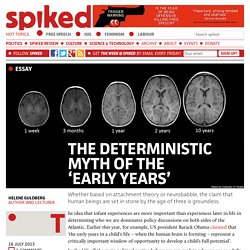
Is the quality of parents’ interactions so important that it can explain how the baby turns out as an adult? Is Obama right to talk about infancy as a ‘window of opportunity’ to develop a child’s full potential’? When the window purportedly shuts, after infancy, is it too late to turn things around? Infant determinists invariably draw on attachment theory, the Ceausescu-era orphanages in Romania and neuroscience to back up their claims about human development.
I will take a critical look at all three. Attachment Theory The UK psychiatrist John Bowlby argued that an important difference between ‘vulnerable’ and ‘resilient’ children is found in the quality of their earliest relationships, particularly their attachment to a mother figure. There is criticism, however. The Determinist Myth of the Early Years. Tuesday 16 July 2013 Whether based on attachment theory or neurobabble, the claim that human beings are set in stone by the age of three is groundless.
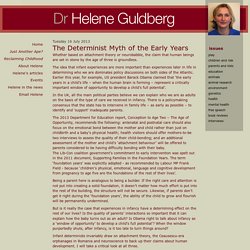
Romanian orphans – a human tragedy, a scientific opportunity. We drove to the orphanage on a pleasant December morning, under a sky that seemed too blue.
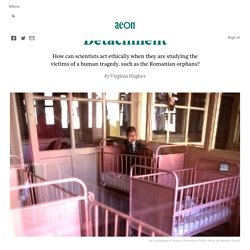
It was a short ride through a residential neighbourhood of Bucharest, littered with posters of politicians’ heads for the upcoming elections. Nervous, I mentally recited the two rules the American professor had given me the night before: no picking up the kids, and no crying in front of them. We pulled up to a dingy pink building, lined on all sides by tall wire fencing, and parked at the curb. After passing through the checkpoint of a stoic security guard, we stepped into an empty hallway. It was cleaner than I had expected; old plaster walls and chipped steps, yes, but no obvious filth.
The Lost Children - Romania. Saving a Lost Generation – The Rush to Adopt Romania’s Orphans - Association for Diplomatic Studies and TrainingAssociation for Diplomatic Studies and Training. The despotic reign of Romania’s Nicolae Ceauşescu caused deplorable living conditions for Romanians and left its most vulnerable citizens – abandoned children — to be literally warehoused.

Orphanages were overrun due to Ceauşescu’s policy of making abortions and contraception illegal while also practically forcing women to have at least four or five children. Most could simply not afford to keep their children and orphanages were unable to adequately care for the children placed there. Around 180,000 children lived in inhumane conditions – no heat, poor clothing, little food, and little health care. Chugani. Attachment: Romanian Orphan Studies. In Rutter’s subsequent research in 2007, he assessed children reared in profoundly depriving institutions in Romania and subsequently adopted into UK families.

Institutionally deprived adoptees were compared at 11 years with children who had not experienced institutional deprivation and who had been adopted within the UK before the age of 6 months. Parental reports, a modified Strange Situation and investigator ratings of the children’s behaviour were all assessed. Results revealed that disinhibited attachment was strongly associated with institutional rearing but there was not a significant increase in relation to duration of institutional deprivation beyond the age of 6 months. Tragedy Leads to Study of Severe Child Neglect.
‘Breathtakingly awful’ War and disease are orphaning children around the world in staggering numbers.
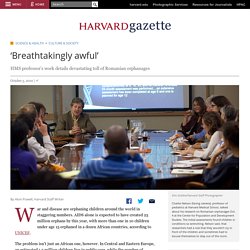
AIDS alone is expected to have created 25 million orphans by this year, with more than one in 10 children under age 15 orphaned in a dozen African countries, according to UNICEF. The problem isn’t just an African one, however. In Central and Eastern Europe, an estimated 1.5 million children live in public care, while the number of children without parental care in Russia has doubled in 10 years. For the last decade, Harvard researchers have been casting a light on orphan care, detailing the horrible toll institutions take on young lives, from physical stunting to delays in language development to mental and emotional disabilities.
The work also highlights the improvements that can be won with high-quality foster care. Nelson presented results of his work Monday (Oct. 4) at the Center for Population and Development Studies. Loving foster homes repaired brain damage of Romanian orphans. "Results from this study contribute to growing evidence that severe neglect in early life affects the structural integrity of white matter throughout the brain,” said report author Dr Johanna Bick of Boston Children's Hospital.
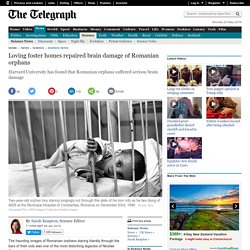
"Our findings have important implications for public health related to early prevention and intervention for children reared in conditions of severe neglect or adverse contexts more generally.” Under Ceauseuscu’s communist state both abortion and contraception were banned, causing birth rates to rocket. Romanian Orphans Investigation. AIMS: One of the consequences of psychological research into the effects of institutionalisation - see Separation, Maternal Deprivation and Evaluating Bowlby - was to greatly reduce the extent to which children were placed in such care.
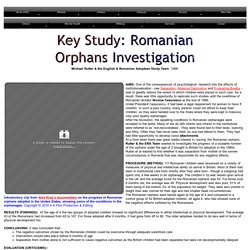
As a result, there was little opportunity to replicate such studies until the overthrow of Romanian dictator Nicolae Ceaucescu at the end of 1989. Under President Ceaucescu, it had been a legal requirement for women to have 5 children. In such a poor country, many parents could not afford to keep their children; so they were handed over to the State where they were kept in massive, very poor quality orphanages. Romanian orphans. Background[edit] Under Nicolae Ceauşescu, both abortion and contraception were forbidden, leading to a rise in birth rates.[2] In October 1966, the Decree 770 was enacted, which banned abortion, except in exceptional cases.[3] This resulted in a sudden increase in the birth rate, especially during the years of 1967, 1968 and 1969.[4] Children born in these years are popularly known as decreței (from the Romanian language word "decret", meaning "decree", diminutive "decrețel").
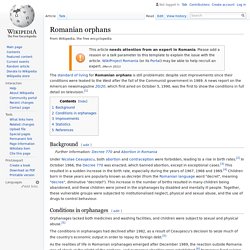
This increase in the number of births resulted in many children being abandoned, and these children were joined in the orphanages by disabled and mentally ill people. Together, these vulnerable groups were subjected to institutionalised neglect, physical and sexual abuse, and the use of drugs to control behaviour. Conditions in orphanages[edit] Orphanages lacked both medicines and washing facilities, and children were subject to sexual and physical abuse.[5] The U.S. Improvements[edit] Statistics[edit] Early Neglect Alters Kids' Brains. Until the 1990s, the orphanages of Romania were notorious for their harsh, overcrowded conditions.

Those perceptions have been borne out in new research that finds growing up in such an environment can change the brain for good. Institutionalization in early childhood can alter a child's brain and behavior in the long run, the research finds. Fortunately, early intervention can stave off the effects. What became of Romania's neglected orphans? BBC secret filming of the conditions in Romanian institutions A BBC investigation has uncovered appalling conditions and abuse in adult institutions in Romania, 20 years after the fall of Nicolai Ceausescu exposed conditions in the country's orphanages. As the care worker unlocked the door and pushed it open, a musty stench of body odour and urine filled the air. There were 10 people crammed into the room, bed-bound on rotting mattresses and lying in their own faeces, some two to a bed.